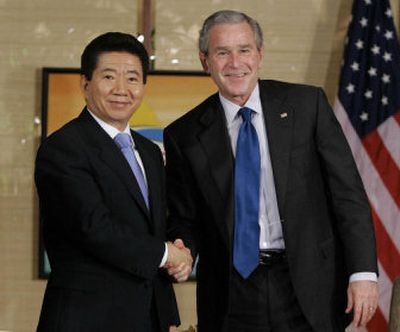S. Korea rebuffs Bush on ship inspections

HANOI, Vietnam – President Bush, trying to stiffen global resolve to confront North Korea, failed to win South Korea’s support today for a tough inspection program to intercept ships suspected of carrying supplies for Pyongyang’s nuclear weapons and missiles.
Bush sought to persuade South Korean President Roh Moo-hyun to fully implement U.N. sanctions imposed on North Korea for testing nuclear weapons. He also sought South Korea’s support in the Proliferation Security Initiative, a voluntary international program that calls for stopping ships suspected of trafficking in weapons of mass destruction.
Roh said his country “is not taking part in the full scope” of the security initiative, but that it would “support the principles and goals of the PSI,” and would cooperate in preventing the transfer of materiel for weapons of mass destruction in northeast Asia.
Bush met with Roh before the opening of a summit of 21 Pacific Rim leaders. The president tried to put the best face on the disagreement, saying he and Roh have a mutual desire to “effectively enforce the will of the world” through U.N. sanctions imposed on North Korea for its nuclear test.
“I appreciate the cooperation we’re receiving from South Korea for the Proliferation Security Initiative,” Bush said.
“Our desire is to solve the North Korean issue peacefully,” Bush said.
“We want the North Korean leaders to hear that if it gives up its weapons – nuclear weapons ambitions – that we would be willing to enter into security arrangements with the North Koreans, as well as move forward new economic incentives for the North Korean people,” he said.
North Korea is a primary target of the Proliferation Security Initiative. South Korea has only been an observer to the program out of concern its direct participation in stopping and searching North Korean ships could lead to armed clashes with its volatile neighbor.
The White House acknowledged that Roh faced political pressure back home not to anger North Korea.
Bush “understands political constraints,” White House press secretary Tony Snow said. “We just had an election” in which Bush’s Republican Party lost control of Congress for the first time in 12 years. Snow said South Korea promised support for the PSI program but he offered no details of Seoul’s cooperation.
Bush is the second U.S. president to visit Vietnam since the war ended three decades ago with U.S. defeat.
Asked if the experience in Vietnam offered lessons for Iraq, Bush said, “We tend to want there to be instant success in the world, and the task in Iraq is going to take awhile.”
His talk about impatience brought a rejoinder back home from Sen. Dick Durbin, who will be the second-ranking Democrat in the new Senate.
“I think we ought to show a little impatience when it comes to the Iraqis and their unwillingness to respond to the need to change,” Durbin said at a St. Louis news conference. “America has been patient. Our troops have been heroic. … It is time for the Iraqis to stand up and defend their own country.”